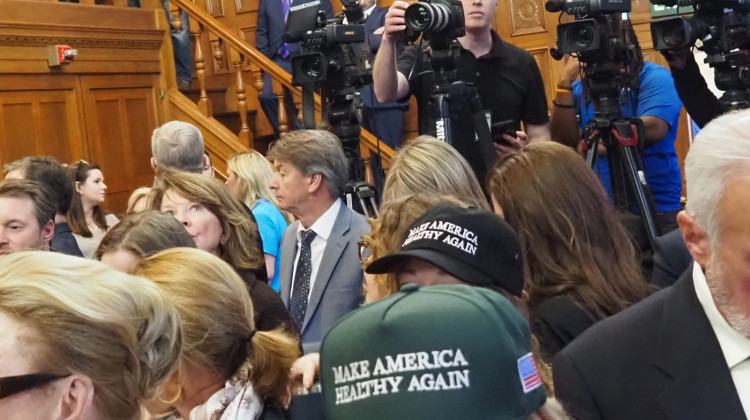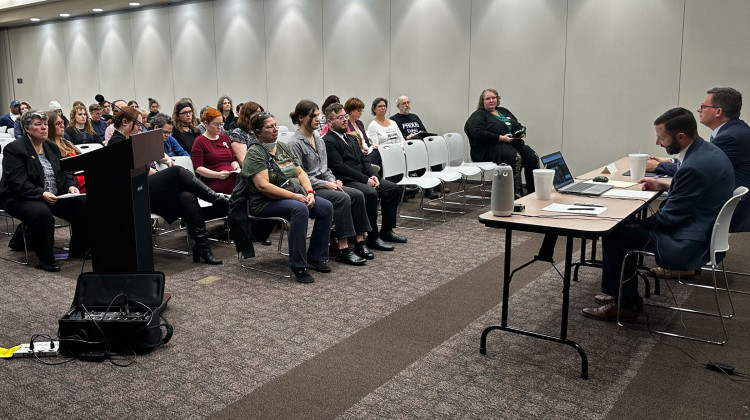
Dr. Neal Agee testifies before the Senate Health and Provider Services Committee about physician non-competes.
Screenshot of Senate committee livestreamIndiana has a doctor shortage. Some lawmakers say banning physician non-compete agreements may help fix that.
Senate Bill 7 originally did that by prohibiting employers from placing any physician under a non-compete agreement after July 2023. Existing contracts would not have been affected.
The House Employment, Labor and Pensions Committee weakened the bill Tuesday, making it a set of restrictions that would nullify a non-compete in certain situations rather than a full ban across all types of physicians.
A hint of the bill’s original intent remains: the bill still includes a full prohibition on new non-competes for primary care physicians only.
Last week, the committee narrowly voted against passing a version of the bill amended to give an exception that would only ban non-competes on primary care physicians. Some of those speaking in opposition to the bill, like the Indiana State Hospital Association, said that change could make it more palatable.
Rep. Ethan Manning (R- Denver) said he could tolerate the weaker version passing committee, but preferred the original full ban.
“This is a classic David and Goliath struggle for me. We have big corporate entities trying to, in my words, essentially hold physicians and their patients hostage. They're the Goliath,” Manning said. “Senate Bill 7 [as it passed the Senate] was a stone to throw at this Goliath. I think we're throwing a Wiffle ball, which is fine. So I'm going to vote yes today to keep it moving with the hopes that we strengthen this as the process moves forward.”
The committee reconsidered the bill Tuesday. This time, they added another amendment.
The new amendment nullifies non-compete agreements across all specialties if an employer terminates a doctor without cause. It also nullifies the agreements if the doctor completes their employment contract term or quits “for cause.”
The amendment does not define “for cause,” so it’s currently not clear which reasons a doctor might have for quitting that would qualify them to be freed from a non-compete.
“As someone who has been a part of the special needs and medical needs community in Indiana … I have seen countless families lose their doctors, not be able to follow their doctors,” said Rep. Becky Cash (R-Zionsville), a co-sponsor of SB 7. “I liked this bill as it was originally written. I accept this bill as it's amended.”
These rules only apply to agreements entered after June 2023, as was the case for the original proposed ban. Primary care physicians would still not be allowed to be placed under any new non-competes in the first place as the committee kept that amendment unchanged.
“The problem that we're trying to solve with the bill is keeping doctors with their patients,” said Manning, the new amendment’s author. “And when we talk about that doctor-patient relationship, a lot of people kind of naturally go towards that primary care physician and we want to make sure that we can preserve those relationships.”
The committee also added language to bolster a 2020 law that required physician non-compete agreements to have a “reasonable buyout provision.” Buyouts allow people to purchase their way out of a non-compete agreement.
But, the law never clarified what “reasonable” meant and didn’t set up any method to decide whether a buyout met that standard. That means the primary way to challenge a buyout based on the reasonableness standard is by suing and letting a judge decide.
The amendment still doesn’t define what “reasonable” means, but it gives physicians and their employers the ability to go to a mediator to determine whether a buyout meets that standard, rather than leaving arbitration as the main avenue for that.
This second time SB 7 passed the House committee, mostly along party lines. Rep. Randy Lyness (R-West Harrison) joined three Democrats in voting against the bill. Lyness said he was hesitant about “getting government into private businesses.”
Rep. Victoria Garcia-Wilburn (D-Fishers) voted in favor of the bill alongside six Republicans. She also broke ranks and voted in favor of the bill during its first House committee hearing, before the new amendments.
“I believe we have a structure that can help to advance Indiana forward, particularly in clinical care,” she said. “And I just really appreciate and love all the investment of my colleagues surrounding health care, surrounding the price of health care, surrounding the autonomy of doctors, negotiating powers of doctors, scopes of practice, of physicians.”
Supporters of the measure – including the Indiana State Medical Association – argue banning non-competes would reduce health care costs, reduce the doctor shortage and protect doctor-patient relationships.
“When [a doctor] wants to see a private practice or wants to go with a different employer even in the same area, they cannot do that because of the non-compete,” said Dr. Pardeep Kumar, Indiana State Medical Association president. “[The doctor] has to move out to a different area to do that. And that is a loss for the community and a loss for physician and patient relationship.”
In testimony, some have pointed to instances where a health care employer has terminated an entire specialty or department and still enforced non-competes on the physicians they terminated.
Dr. Neal Agee, an oncologist, told lawmakers his non-compete forced him to stop practicing in Fort Wayne after he quit working for a major health care company because they reduced staffing and support to his cancer surgery team.
“There was no other surgical oncologist within that area of northeast Indiana. So now we've gone, after nine years, we've gone back to square one,” Agee said. “We now have a lot of Hoosiers who are in the middle of care, who were seeking care, who needed these types of services that weren't able to get them and now have to be referred out to other types of institutions.”
READ MORE: Physician non-compete ban passes Indiana Senate intact
Join the conversation and sign up for the Indiana Two-Way. Text "Indiana" to 73224. Your comments and questions in response to our weekly text help us find the answers you need on statewide issues throughout the legislative session. And follow along with our bill tracker.
Opponents of SB 7 largely include employers and industry groups, who argue that supporters are wrong to believe a ban on non-competes would result in lower health care costs.
David Dunkle is CEO of Johnson Memorial Health in Franklin.
“Non-compete agreements are standard business practice to protect an organization's investment, including capital, time, training and new equipment to recruit and retain physicians,” he said. “As someone who has just gone through a nursing shortage and paying in bidding wars, I can tell you it will raise costs. As a physician, I want to note that advocating to maintain non-compete agreements as a legitimate business tool is not in opposition to supporting Indiana's physicians.”
The bill now heads to the House floor where it could be amended further. If it passes with amendments, SB 7 would have to be returned to the Senate, which can either agree with the changes and send the bill to the governor or disagree and try to change the bill again. Senators overwhelmingly voted to pass SB 7 earlier this session.
Committee chair Rep. Heath VanNatter (R-Kokomo) asked the bill’s author, Sen. Justin Busch (R-Fort Wayne), whether he would commit to concurring with the House’s version of the bill if it returns to the Senate floor with the committee’s amendments and nothing more.
“I will take that back from my body and encourage them to concur this bill,” Busch said.
“You will not commit to concur?” VanNatter asked.
“I think I've answered your question,” Busch said in response.
What we know about existing medical non-competes in Indiana
Employers and industry groups have often not given specific answers when asked what the terms of their non-competes look like by lawmakers. Several have said it varies between specialties and sometimes between individual doctors.
Indiana Public Broadcasting contacted nearly two dozen state and local government-owned hospitals to get details about any non-competes they might apply to physicians and other staff. Only two replied.
A state spokesperson said “we do not have non-competes with our state-employed doctors at our state psychiatric hospitals,” when asked about Evansville State Hospital. They did not respond to further questions about why that is the case.
Brad Rogers, chief operations officer of Woodlawn Hospital in Rochester, said in an email from February that Woodlawn has 16 physicians under 12-month non-competes.
“We are part of a health care provider shortage area which makes recruitment a high cost and challenge,” Rogers said in an email. “It typically takes three years or more to recuperate the cost of bringing in a new physician. Non-compete clauses are a way to help reduce the risk of losing our providers to surrounding counties and/or organizations. Hospitals in small communities like ours bear a substantial financial and public perception risk when bringing on a new physician.”
Rogers said the hospital does not have other staff under non-competes and does not have a buyout option for their physician agreements.
“Due to the highly competitive cost of recruitment, we utilize non-compete clauses to prevent further loss of revenue, but more importantly, to protect the needs of the community we serve,” he said. “We need doctors to serve the citizens of Fulton County for many years so patients receive stable and reliable care from a doctor who knows them.”
When asked why Woodlawn does not have buyouts in its physician non-competes despite the 2020 law requiring “reasonable buyout provisions,” Rogers did not respond.
Adam is our labor and employment reporter. Contact him at arayes@wvpe.org or follow him on Twitter at @arayesIPB.
9(MDAyMzk1MzA4MDE2MjY3OTY1MjM5ZDJjYQ000))
 DONATE
DONATE






 Support WFYI. We can't do it without you.
Support WFYI. We can't do it without you.